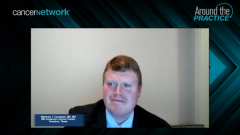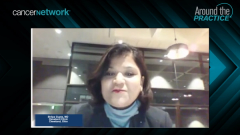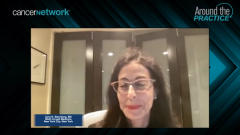
Future Treatment Landscape of Metastatic Urothelial Carcinoma
Closing their discussion on metastatic urothelial carcinoma, panelists reflect on novel agents and the future treatment paradigm.
Episodes in this series

Transcript:
Peter H. O’Donnell, MD, PhD: Matt, I’ll ask you this question. One bit of data we haven’t gotten around to yet is the adjuvant immunotherapy approval that happened for nivolumab. It’s clearly introduced another treatment paradigm for us with adjuvant immunotherapy. How do you think that might affect the metastatic setting and treatment choices in the metastatic setting?
Matthew T. Campbell, MD, MS: It’s got a big impact, because if patients still receive it, we’re going to have different categories of patients we’ll have to learn from. We’ll have patients who have progressed while on adjuvant nivolumab, and those patients are likely going to be more refractory to further immunotherapy approaches later. We’ll have patients who will probably relapse a year or 2 after adjuvant nivolumab, and those are patients who probably will be candidates to rechallenge the JAVELIN 100 paradigm with chemotherapy. My hope is when we get to that point, we’ll have clear data on combinations with, perhaps, enfortumab and pembrolizumab and other combinations. I think it’s going to create a whole new set of questions.
Peter H. O’Donnell, MD, PhD: Shilpa, are there any promising new therapies or combinations you think are the next big thing on the horizon for metastatic urothelial cancer?
Shilpa Gupta, MD: The frontline enfortumab and pembrolizumab data are very powerful. We saw from the smaller EV-103 study [NCT03288545] and the ongoing EV-302 trial [NCT04223856], where that’s being compared with standard-of-care platinum, and patients are getting maintenance immunotherapy on that as a standard. That would be key, and I see a [good] possibility that, that might become the next frontline regiment, if the data are reproduced, and may replace platinums in this setting. We [recently] saw it as more of the frontline FGFR [fibroblast growth factor receptor] inhibitor and immunotherapy data as well, and that was pretty good in those patients with alterations.
Peter H. O’Donnell, MD, PhD: Cora, how about you? What are you excited about in the pipeline?
Cora N. Sternberg, MD: I would agree with you, too. The EV plus pembrolizumab we’ve been evaluating—I think it’s called cohort K of the trial—even in patients who have really poor creatinine clearance have been doing remarkably well. The original data were all done on patients who were platinum ineligible—[approximately] 83% response rates—so I imagine really high response rates, and this could easily replace platinum chemotherapy. As I said, the only problem is the neuropathy, so it would depend on how many cycles we give and how we give it. But I think that’s the most promising [at the moment], unless sacituzumab starts working its way up. But for now, I would say that [combination is] the most promising.
Peter H. O’Donnell, MD, PhD: Matt, this may be a challenging question to end this on. What do you think is the greatest unmet need in metastatic urothelial cancer?
Matthew T. Campbell, MD, MS: We struggle with—we have a good number of patients [who] are not platinum eligible patients [who] come into our clinic. I would say at least half the patients [who] come in are not represented well by the studies. We still need to figure out our best options for patients [who] have the most aggressive disease and see how we can have those translate to the community setting.
Peter H. O’Donnell, MD, PhD: I will end by saying a big thank you to Dr Sternberg, Dr Gupta, and Dr Campbell. What a great lively discussion. I really enjoyed being with all of you. We should also thank our audience here for all the great questions they sent in, and thanks to everyone for this program tonight.
Transcript edited for clarity.
Newsletter
Stay up to date on recent advances in the multidisciplinary approach to cancer.










































